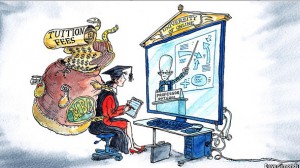Tyler Durden writes: When it comes to funding, the most sophisticated market participants, hedge funds, have zero use for conventional cash exposure such as exchange margin, which is well below half a trillion, and instead obtain at least half of their funding needs in the shadow market via repo, to the tune of about $1 trillion (and likely more depending on one’s assumption about collateral reuse). Why Margin Debt is Meaningless
Author Archives: Andi Howe
Wearable Robot in Development
The Wyss Insitute for Biologically Inspired Engineering at Harvard University is on its way to building a “wearable robot”: a biologically inspired smart suit that will fit comfortably under clothing and enhance the mobility of its wearer. On Thursday, this Soft Exosuit received a first-phase, $2.9 million funding contract from the Defense Advanced Research Protection Agency (DARPA), advancing development of the wearable robot that could eventually serve not just soldiers, but the elderly and those with disabilities.
The official release notes that DARPA’s Warrior Web program will seek to enhance the mobility of the healthy (like soldiers who may have to walk long distances) while restoring mobility of those with disabilities; for instance, those who suffer from strokes often have trouble walking.
What sets the Soft Exosuit apart from other existing wearable robots is the model’s lack of rigid components and cumbersome, sturdy outer shells and battery packs that make movement feel unnatural. The Exosuit uses soft textiles made to be worn under clothing and pulled on like a pair of pants. Once on, the biologically inspired suit is designed to mimic human movement while assisting joints in a carefully timed, unrestrictive manner.
Conor Walsh, assistant professor of mechanical and biomedical engineering at Harvard’s School of Engineering and Applied Sciences, shared in a statement, “While the idea of a wearable robot is not new, our design approach certainly is.”
Therefore, the success of the Soft Exosuit, and its ability to be used both among military personnel and the average civilian, is implied within its comfortable-wear design. To execute this, the Wyss Institute has partnered with Boston-based athletic footwear and apparel company New Balance as the Exosuit’s manufacturing advances. The release cites New Balance as a “key collaborator” that will bring “expertise in textile and apparel innovation” to the newest phase of the wearable robot. 
750 Women Needed to Go on Boards in India
More than half the listed companies in India are yet to appoint a single woman director to the board—a legal requirement in India now—and they have less than one month to do so.
Two hundred and forty four companies, which did not have a woman director earlier, have complied with the requirement in the last six months. A fifth of these directorship positions have gone to women belonging to the promoter family.
“These women shall have the same voice as the promoter, defeating the very purpose of genuine (independent) gender diversity,” said Pranav Haldea, managing director of PRIME Database which operates indianboards.com. Even after the recent appointments, women occupy just 7% of the total directorship positions.
Is Energy the Real Force Behind Growth in the US?
Lee Adler writes: Take away energy and the US economy is not doing that well. In some ways, it’s not growing at all. What growth there is appears entirely due to the energy boom and its ripple effects. Thank goodness for that boom and the technological changes that led to it. Environmentalists may feel differently, but without that growth in energy the US economy would be in even deeper trouble than it is.
EU Threatens More Sanctions Against Russia
The leaders of the European Union have instructed the European Commission and the EU’s diplomatic service to prepare further sanctions to be imposed on Russia, in reaction to its military action against Ukraine.
Herman Van Rompuy, the president of the European Council, said the EU was ready to take “significant further steps in light of the evolution of the situation on the ground”. He condemned the movement of Russian troops and weaponry into Ukraine. Angela Merkel, Germany’s chancellor, said that sanctions would be imposed “if the situation in the last days goes on”. Merkel also committed money to help rebuild the damaged infrastructure in Ukraine.
The European Council adopted conclusions that called for a ceasefire and urged Russia to implement a peace plan prepared by Ukrainian president Petro Poroshenko, who attended the Council meeting.
Van Rompuy denounced “the presence of Russian armed forces on Ukrainian soil”. José Manuel Barroso, the president of the European Commission, said: “What is happening in the eastern part of Ukraine is war.”
It is unclear whether the mooted sanctions will be an intensification of existing measures affecting exports in the military, energy and the financial sectors, or will extend into new economic sectors.
The Council specifically instructed the Commission to include in its proposals a measure “on the basis of which every person and institution dealing with the separatists groups in the Donbass [region of eastern Ukraine] will be listed”.
Barroso said that at a meeting with Poroshenko he had said that the EU stood ready to provide “an additional €1 billion in loans to Ukraine”.
The EU leaders also discussed the worrying state of the European economy, in light of a very low level of inflation and extremely high unemployment. They agreed that the situation raises “significant concerns”. “In recent weeks economic data have confirmed that the recovery, particularly in the euro area, is weak,” the conclusions state. The leaders agreed to hold a special summit on jobs and growth in Italy in early October, and a summit of government leaders from eurozone countries following the European Council in late October.
Speaking after the Council, Hollande said the situation was unacceptable. “The diagnosis is unquestionable. It’s a widespread situation, there are some countries in recession, and inflation has reached a historic low everywhere. Therefore there is a European problem, a lack of sufficient demand.”
What Will Central Bankers Discuss in Wyoming?
Mohammed A. El-Erian writes: Minutes released yesterday from the latest policy-making meetings of the U.S. Federal Reserve and the Bank of England confirm that central bankers will have plenty to discuss when they gather for their annual conference in Jackson Hole, Wyoming, starting Friday.
Most important, the minutes illustrated unusual disagreements over how much more central banks can and should do to support economic growth and combat persistent unemployment.
At the Bank of England, two members of the monetary policy committee broke ranks with the majority, favoring an immediate interest-rate increase despite low inflation and no wage growth. In the case of the Fed, officials disagreed not only about how much slack remains in the labor market, but also about how to measure it — both crucial issues in determining how much longer the central bank should keep trying to stimulate economic growth.These issues will be front and center at the Jackson Hole conference, and will probably be the subject of Fed Chair Janet Yellen’s keynote speech Friday. Time is of the essence, because much of the discussion will explore whether central bankers’ moment to change course could be drawing near. As the Fed put it in its minutes, officials “generally agreed that both the recent improvement in the labor market conditions and the cumulative progress over the past year had been greater than anticipated and that labor market conditions had moved noticeably closer to those viewed as normal in the longer run.”
The minutes also displayed a reluctance to talk about an issue that is gaining attention as prices in financial markets become increasingly detached from underlying economic conditions: the trade-off between the immediate gains from stimulus and financial stability. A number of prominent economists are warning that the developed world may have fallen into a low-growth equilibrium known as secular stagnation, in which the extraordinary measures adopted by central banks to achieve more robust growth could ultimately destabilize financial markets. Paraphrasing what Ben Bernanke said in his 2010 speech to the Jackson Hole conference, policy makers will have to consider whether they are near or past the point where the benefits of their actions are harder to justify given rising costs and risks.
Finally, the minutes said little about what the global impact will be if the Bank of England and the Fed start easing off the accelerator at a time when the European Central Bank is likely to intensify its stimulus efforts. If the divergence persists, the further shifts in interest rates and currencies could trigger volatility in financial markets around the world. It’s a topic that definitely should also be on the agenda in Jackson Hole.
China to Continue Monetary Policies to Shore up Economy
China’s central bank said on Wednesday that it will continue to implement a targeted approach in monetary policy in the second half of 2014 and shore up weak links in the economy.
More financial support will be provided to rural areas and small businesses to reduce their financing costs, according to a statement on the website of the People’s Bank of China. It said it will accelerate work to establish a deposit insurance scheme in the coming months.
The statement came after a meeting between the central bank governor and heads of the bank’s branches across the country to review monetary policy in the first half and map out policies for the second. The central bank also said it will strengthen monitoring of financial risks in key sectors and industries, and handle the risks in a timely manner to prevent regional and systemic risks.
Emma Fry Starts a Vegan Travel Company
When Emma Fry wanted to go on a vegan friendly holiday in Europe, she couldn’t find a company to help. It simply didn’t exist. So she decided to launch one (after riding her motorbike around Guatemala, drinking lots of coffee and overdosing on avocados).
Now, the 31 year-old (known to friends as ‘the vegan biker’) from Dorset, runs Veganbnb Travel and divides her time between Guatemala, Spain and the UK, where she runs foodie adventures for vegans, vegetarians – and just about anyone who’s interested in being happier and healthier. Emma Fry Interviewed
Impact of the New Brics Bank
The bank, announced at the summit in Fortaleza, Brazil, will also have a monetary twin to provide short-term emergency loans, the Contingency Reserve Arrangement. While the bank will be open to all UN members, the reserve will lend only to the contributing BRICS countries in times of crisis. Impact of the New Brics Bank
Chinese Business Schools Teach Western Style
More business schools in China are tapping experience from the West and elsewhere to meet the country’s growing demand for business elites.
Earlier this month, Shanghai’s Fudan University and London Business School jointly launched a business degree program. Their Global Masters in Management program boasts a combination of teaching modes and real-life experience from East and West. It will include business immersion through company projects. Leading Chinese companies will mentor some of these managers.
The partnership with London Business School, one of the world’s top business education institutions, will help us reach a higher level in terms of expertise. It will also help draw out the best of the management systems employed in both the East and West, aiding the development of more capable leaders in the future,” Lu said.
Andrew Likierman, dean of the London school, said: “This program will give its graduates a ‘two-world’ mindset, combining direct exposure to China and the West. The balance of theory and practice will ensure that students gain a head start in the competition for the world’s best business jobs.”
Fudan’s business school has also worked with other prestigious schools overseas to carry out cooperative programs. The university has worked with Washington University to launch the Executive MBA program, which prepares senior-level professionals in China and other parts of Asia for global leadership.
“As the nation’s commerce takes off, it has become important for companies’ higher management to have a better understanding of the thriving Chinese economy and business practices. We have already seen the growing demand from employers for business talent with profound experience in China and the West,” said David Huang, a veteran headhunter who has worked in a multinational talent recruiter in Beijing.
“In this regard, how to provide a combined education with global vision and practical knowledge suitable for the local market becomes an issue,” he said.
Many consider Chinese business schools to have experienced a late start compared with those in the West. They have also faced a number of challenges, including lagging training modes, insufficient practical cases to draw on and ignorance about career design for students.
Over the past years, these schools have been implementing global strategies to help plug these gaps.









